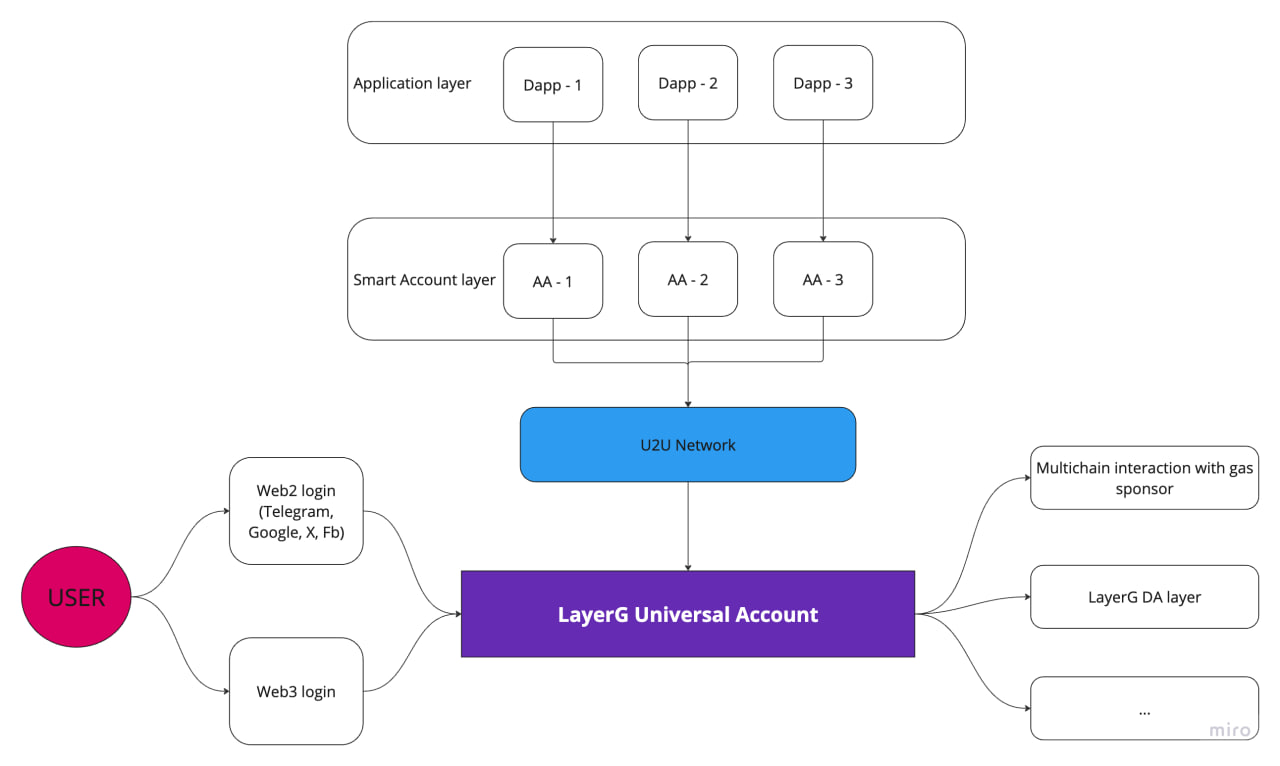User accounts
User account consists of 2 components: runtime account & blockchain account (Universal Account)
Universal Account
The Universal Account is a unique identity built on Web3 account abstraction, enabling seamless access and asset management across multiple blockchain applications. It simplifies interactions by abstracting complexities such as private key management and gas fees while ensuring security and interoperability across different platforms.
Each Universal Account can be linked to multiple Runtime Accounts, which serve as session-based or environment-specific identities for different applications, games, or dApps. These Runtime Accounts inherit permissions and assets from the Universal Account, allowing users to engage within LayerG ecosystem while maintaining a unified identity.

Runtime Account
A user represents an identity within the server. Every user is registered and has a profile for other users to find and become friends with or join groups and chat.
A user can own records, share public information with other users, and authenticate via a variety of different social providers.
The system owner identity is represented by a user account with a nil UUID (00000000-0000-0000-0000-000000000000).
Fetch account
When a user has a session you can retrieve their account. The profile contains a variety of information which includes various “linked” social providers.
Some information like wallet, device IDs and custom ID are private but part of the profile is visible to other users.
| Public Field | Description |
|---|---|
| user.id | The unique identifier for the user. |
| user.username | A unique nickname for the user. |
| user.display_name | The display name for the user (empty by default). |
| user.avatar_url | A URL with a profile picture for the user (empty by default). |
| user.lang | The preferred language settings for the user (default is “en”). |
| user.location | The location of the user (empty by default). |
| user.timezone | The timezone of the user (empty by default). |
| user.metadata | A slot for custom information for the user - Read only from the client. |
| user.edge_count | Number of friends this user has. |
| user.create_time | A timestamp for when the user was created. |
| user.onchain_id | User's blockchain wallet address. |
| user.update_time | A timestamp for when the user was last updated. |
| user.online | A boolean that indicates whether the user is currently online or not. |
| user.onchain_id | User's blockchain wallet address. |
| Private Field | Description |
|---|---|
| Email address associated with this user. | |
| devices | List of device IDs associated with this user. |
| custom_id | Custom identifier associatedwith this user. |
| wallet | User’s wallet - Read only from the client. |
| verify_time | A timestamp for when the user was verified (currently only used by Facebook). |
User metadata
You can store additional fields for a user in user.metadata which is useful to share data you want to be public to other users. We recommend using user metadata to store very common fields which other users will need to see. For example, use metadata to enable users to show biographical details if desired, or to display their character name, level, and game statistics.
For all other information you can store records with public read permissions which other users can find.
Metadata is limited to 16KB per user. This can be set only via the script runtime, similar to the wallet.
The following example showcases using user metadata to store a VIP status which is then used as part of a before join tournament hook which only allows VIP members to join.
Virtual wallet
LayerG has the concept of a virtual wallet and transaction ledger. LayerG allows developers to create, update and list changes to the user’s wallet. This operation has transactional guarantees and is only achievable with the script runtime.
With server-side code it’s possible to update the user’s wallet.
The wallet is private to a user and cannot be seen by other users. You can fetch wallet information for a user via Fetch Account operation.
Online indicator
LayerG can report back user online indicators in two ways:
- Fetch user information to see if they are online. The user presence will be detected if they have an active socket connection to the server and did not set
appearOnline=false. - Publish and subscribe to user status presence updates. This will give you updates when the online status of the user changes (along side a custom message).
Fetch users
You can fetch one or more users by their IDs or handles. This is useful for displaying public profiles with other users.
You can also fetch one or more users in server-side code.
Update account
When a user is registered most of their profile is setup with default values. A user can update their own profile to change fields but cannot change any other user’s profile.
With server-side code it’s possible to update any user’s profile.
Delete account
You can delete a user’s account on the server. This will remove all data associated with the user.